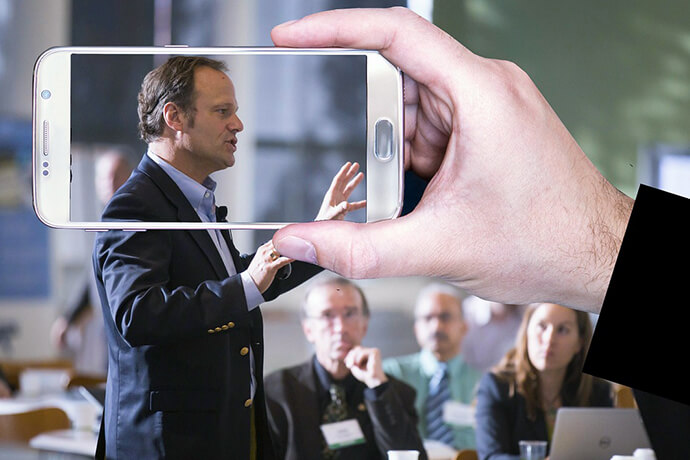 SPEAKERS
SPEAKERS
Persuasion isn't manipulation—it's a valuable skill for achieving goals. Learn it through communication courses.

When we hear "persuasion," some of us might think of manipulative tactics. But persuasion is actually a valuable skill for achieving our goals in life. It's about reaching common ground or getting others to take action, often honed through communication courses.
While some seem naturally gifted at persuasion, the truth is that it's a skill that can be learned and refined over time. Take Steve Jobs, for example.
He didn't just stumble upon groundbreaking ideas; he excelled at convincing others to join him on his journey to innovation.
In this article, we'll explore how mastering persuasion can elevate your speaking abilities.

The art of persuasion in public speaking involves convincing your audience to believe in or take action on a specific idea, product, or service. It's about understanding what your audience values and connecting with their emotions to build trust. Persuasion isn't about manipulation; it's about respectfully convincingly presenting your ideas.
In both leadership and everyday life, the ability to influence and persuade is crucial. Whether you're convincing your family to choose a mountain vacation over the beach or leading a team at work, these skills are invaluable. However, persuasion isn't just about going through the motions; it's a deliberate process that requires conscious effort.
Some folks have a knack for persuasive speaking, but it's a skill anyone can develop. With the art of persuasion, you can get your audience to see things your way, keep them hooked, and encourage them to join the conversation. It's all about sparking genuine interest and interaction.

To craft a powerful speech that sways opinions, keep it concise, clear, and persuasive. Skip the jargon and complex language—keep it simple and relatable. And if you want guidance from the pros, reach out to The Speakers Agency for expert assistance. We’ve got you covered.
This persuasion relies on the speaker's credibility and expertise in a specific field. It aims to convince the audience that the speaker is knowledgeable and trustworthy. For instance, a doctor discussing medication benefits utilizes their authority to persuade.
Pathos appeals to the audience's emotions, creating a connection and evoking empathy, fear, joy, or anger. For example, a speaker advocating for animal rights may use emotional stories and images to engage the audience's empathy.
Logos appeals to the audience's logical reasoning by presenting facts, statistics, and evidence to support an argument. For instance, a speaker proposing a business idea uses data to demonstrate its feasibility and profitability.
Credibility building is an important part. Being confident in your speaking skills makes presenting a breeze. Show off your expertise early on in your presentation, but don't lead with your credentials. Instead, grab your audience's attention with a hook right from the start.
The key ingredient to speaking confidently is thorough preparation. Organize your thoughts, jot them down, and then rehearse! Without practice, you might stumble or hesitate, making it difficult to persuade your audience.
Practice in front of friends, family, or anyone you trust. You can even practice in front of a mirror to get comfortable with your delivery and commit your speech to memory.
Start your public speech by sharing a captivating story about yourself in the first 30 seconds. This story should relate to the presentation topic and establish you as an authority.
Engaging your audience with a compelling narrative will capture their attention and encourage active listening throughout your speech.
When crafting your persuasive speech, stick to 1-3 main goals. Focusing on just a few key points helps avoid confusion for your audience. While you might have numerous related ideas, honing in on these main goals guides your audience through the most crucial aspects of your message.
Rhetorical questions can be powerful tools in a speech. They add drama and prompt your audience to think about your message. While they don't require a response, they engage your listeners and keep them interested. However, avoid overusing rhetorical questions, as this can make you sound unsure or repetitive. Use them strategically for maximum impact.
When delivering your speech, aim to persuade your listeners honestly. Persuasion involves presenting what's best for your audience and allowing them to make their own decisions.
However, avoid crossing the line into manipulation, where you might deceive others into actions that don't benefit them. Being truthful and sincere builds trust with your audience.
When delivering a speech with your persuasive techniques, connect with your audience by making eye contact. Rather than staring at one person, scan the room and briefly focus on different individuals. This helps create a connection and keeps your listeners engaged.
Conclude your speech with a powerful finale. Imagine yourself as a lawyer making a compelling closing argument to the jury.
Structure your closing statements with confidence and weight. After delivering your impactful final line, pause for about six or seven seconds before offering to take questions. This leaves a lasting impression on your audience.
Humans are naturally interested in themselves. We often focus on our own experiences and thoughts.
When you show genuine interest in others and care about their concerns, they're more likely to reciprocate that interest. This creates a positive connection and encourages audience engagement.
Mastering the art of persuasion and influence takes dedication and patience. It's not just about saying, "Trust me," and expecting others to follow blindly.
Instead, it's about crafting compelling arguments and patiently explaining your reasoning over time. Changing someone's perspective requires gentle and consistent communication skills. While it may take longer to convey your message effectively, it's worth the effort. Also, make sure to read some books on the art of persuasion or watch some art of persuasive speech.
If you're ready to dive deeper into this skill, consider organizing a workshop with The Speakers Agency. With the guidance of an experienced speaker, you can learn valuable techniques to enhance your persuasive abilities.